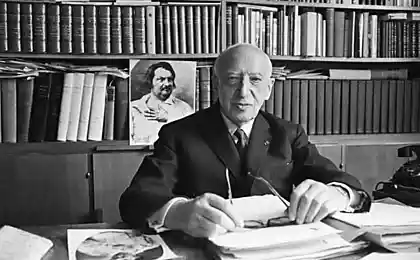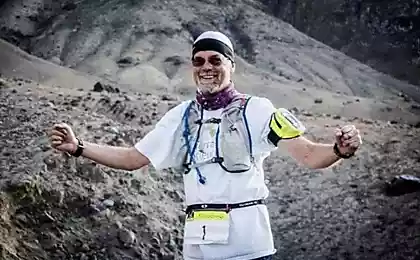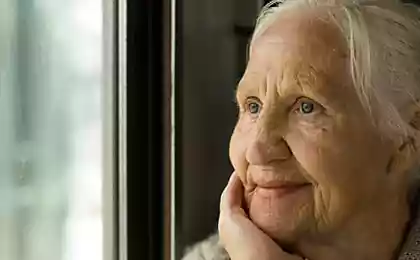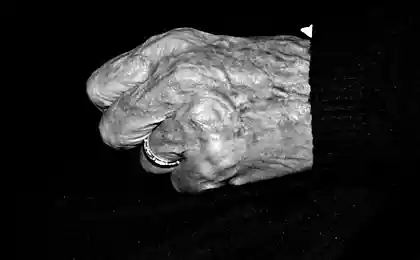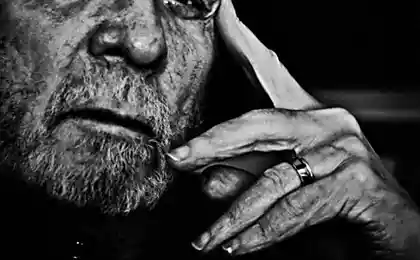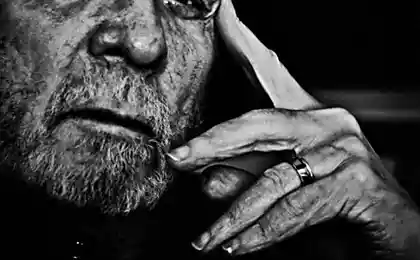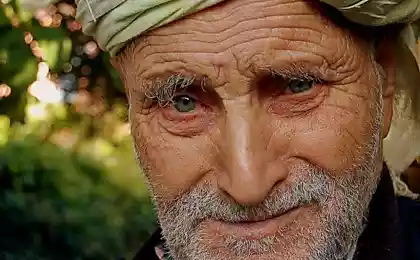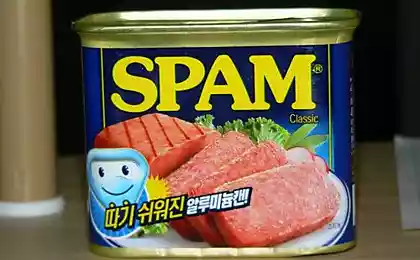293
Vladimir Skulachev: Old age is a disease that can be treated
The hard-to-speak phrase mitochondrial antioxidant, or Skulachev ion SkQ1, is a substance that can prolong and improve human life. This development has been around for many years, but it's now being tested on humans.
Its author, Academician of the Russian Academy of Sciences, Director of the Research Institute of FHB named after A. N. Belozersky Moscow State University, Dean of the Faculty of Bioengineering and Bioinformatics of Moscow State University Vladimir Skulachev told The Village whether scientists have learned to prolong life and how science will help to avoid humiliating old age.
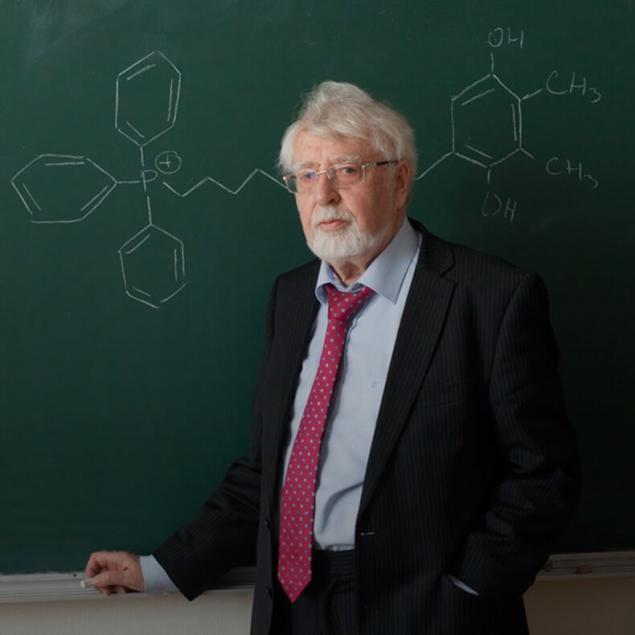
Long Life and the Elixir of Youth
- Is it true that using your SkQ1 ions can slow aging?
- If all goes well, then to some extent yes. We act on a stimulant of aging - poisonous forms of oxygen. They are formed in the mitochondria, and their level increases with age. And our ions, such as the mitochondrial antioxidant SkQ1, neutralize toxic oxygen species.
- How did you come to the conclusion that mitochondria should be affected and that the aging process is tied to them?
- This was not invented by us, but by the American scientist Denham Harman - he put forward a theory back in the 70s that aging occurs due to poisoning of the body by its own toxic forms of oxygen, which are formed in the mitochondria. Mitochondria serve as a kind of thermal powerhouse of the cell. As they age, they produce more and more toxic oxygen species, which I call the samurai sword of the cell. It must be knocked out of the “hands” of the cell that intends to kill itself, and thereby accelerate the aging of the body. We believe that aging is a disease that can be treated with conventional medications.
- And can this be done with your connection? How does it affect cells?
- This is a synthetic compound called SkQ1, which is not found in nature. It consists of two parts: the so-called Skulachev ion, or SkQ+, and the powerful plant antioxidant plastoquinone (Q), connected by a chain of carbon atoms. The compound is positively charged and penetrates the mitochondria because it is the only compartment in the cell whose inner space is negatively charged. So simple physics works here. And then this substance neutralizes toxic forms of oxygen.
- Is there any evidence that this really works?
- We have tested on different mammals, fungi, plants and invertebrates. Almost everywhere there was a significant increase in life expectancy with very small amounts of SkQ1.
- How important is it?
- Different creatures have different things. In mice, for example, the record increase in life expectancy after the drug is twice. About the same - in crustaceans, and in fruit flies - less, we are talking about 15%. As for mice, the first experiments we asked to put the President of the Russian Society of Gerontologists Vladimir Anisimov at the Institute of Oncology in St. Petersburg.
There was never money, and there was not enough money to maintain the vivarium, so the mice contracted various infections and did not live long. Those animals that received our substance survived, despite the fact that the vivarium was dirty, it produced infections from which mice would die earlier. In addition, these mice remained childbearing activity until death. They looked different on the outside.
If you take two mice of the same litter and the same age, the one that took SkQ1 looks really young: it has smooth hair, no slouching, a lush mustache. The second, on the contrary, has all the signs of old age: hump, inactivity, bald spots on the coat, no mustache.
- What did these mice eventually die of?
- Breast cancer. These experiments were put on females of the line of mice that are prone to this disease. In addition, it is a cancer that is resistant to our drug.
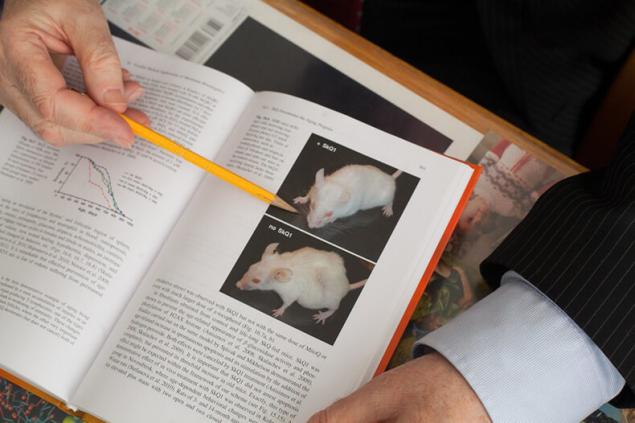
- Are there any cancers that SkQ1 can affect?
- Yeah, but for now, it's just mice. Human studies began six months ago, and we are now testing the safety of the drug. In total, there will be three stages: there is still a test for effectiveness on a small number of people in a short time and a long test on a large contingent. The trials are being conducted in parallel in the United States and Russia, at the First Gradskaya Hospital, and they will last about another two years.
- And what happens after that? Will the drug go on sale?
- Yes, it will be an elixir...
- Elixir of youth?
- That's right. But there is a big problem: doctors believe that old age is not cured, therefore, there can be no cure for old age. Therefore, the Ministry of Health is unlikely to approve the release of the “elixir of youth”. Most likely, it will be a drug for senile diseases and we will not advertise it as an anti-aging medicine at all.
The fact is that this area is very compromised, there are so many charlatans in it who are just trying to get money from gullible people. Among geriatricians (specialists in the treatment of elderly patients). There is even a saying: “Thousands of people were engaged in immortality, but they all died.”
Genghis Khan spent a lot of money to find sages who would prolong his life, and he died. Stalin was fond of the work of the gerontologist Alexander Bogomolets, but when he died in 1946 at the age of 65, the leader banged his fist on the table and exclaimed: “Dude, son of a bitch!”
I am absolutely convinced that we die not because the body has worn out, but because there is an order to die, and this process starts and proceeds slowly.
- Do you have any doubts about what you are doing?
- The goal is so sacred that if there is any chance of breaking through here, we should use it. After all, the horror lies not even in the very fact of death, but in the fact that a person dies humiliatingly: yesterday he was a ruler, but today he cannot bring a spoon to his mouth.
- So if things work out, people won't just live longer, they'll stop getting sick?
- Yes, we have already found that mice receiving SkQ1 have less memory loss and a reduced risk of cardiovascular disease. The most important thing is that people will live better, will be able to work longer, and this is beneficial to the authorities, because now the elderly are a huge burden for the state.
- Will you need to take elixir constantly? When to start, in old age or earlier?
- It will need to be taken continuously, but when to start is a good question. We tested on fruit flies and found that if you give them our substance only during the first week of life (and they live two months), then life expectancy increases. And if you start treatment in a month, then weekly therapy is not enough and you have to treat flies with the constant addition of SkQ1 to their food. It's not a fact that humans will react the same way a fly does, so we've now turned our attention to human clinical trials.
- Is it possible to say that this connection is completely safe?
- Ideally, it should be two years after the start of human trials, but I have been taking SkQ1 for four years - I'm an inventor, I can - and there are no side effects. I can honestly say that working capacity increases, there is more energy. The rest is hard to say considering I am 81.
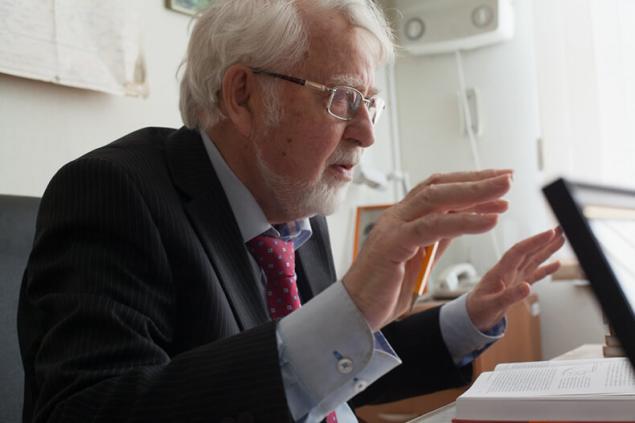
- How affordable will this drug be? Is it not possible that only the rich can prolong their lives, and the poor will die?
- Elixir will be available. I cannot say how much it will cost, because we are not businessmen, we do not sell it ourselves, but conclude agreements with companies that cooperate with pharmacies. But SkQ1 itself is inexpensive and requires very little.
The first drug based on these ions that we released is eye drops. They are already in pharmacies and are recommended for patients with dry eye syndrome and cataracts. Drops, like SkQ1, affect mitochondria, and I used them to get rid of cataracts.
We developed a similar drug for animals and calculated that to provide medicine to all pets in Russia suffering from senile vision defects, it takes only four grams of our substance per year. Investors were very upset at the time. They thought we were going to build a whole plant, start production, and we still only have one small room to synthesize our substance. It acts in extremely low concentrations, precisely because it accumulates only in the mitochondria.
- So the medicine will be for everyone, regardless of social status?
- My dream is to add it to salt, just like iodine. Previously, all jokes were not about the Chukchi, but about the Swiss, because they had a high percentage of people suffering from cretinism. This is a medical concept, the consequences of a thyroid problem due to a lack of iodine. The situation changed when they began to add a little iodine to the salt. In the same way, I suggest putting our ions in salt to extend people's lives.
- This is a great humanitarian mission. Do you think government and investors will support you? Why hasn't the government seized on your designs yet?
- Because we're cunning and we don't want to be shouted about until we've done it. But at the same time, investors aroused interest in our drug. Until 2008, Oleg Deripaska gave us money, only thanks to this we were able to buy equipment and start research. I was also able to bring in scientists who had gone abroad in the past — we provided them with housing, rented them apartments.
In the best years in our research Institute Mitoengineering MSU worked up to three hundred people, and now there are about a hundred: times are difficult, business is bad. Since 2009, we have been helped by Rusnano and one private investor – a programmer, a graduate of Moscow State University. But from January 1, 2017, the investment ends, and we will have to live on the profit that we receive from the sale of eye drops and another cosmetic product, Mitovitan.
- Can you tell us more about this cosmetic?
- This serum, which prevents skin aging, is also effective in various inflammations, and even those that are not treated in other ways. We are currently conducting tests in Moscow.
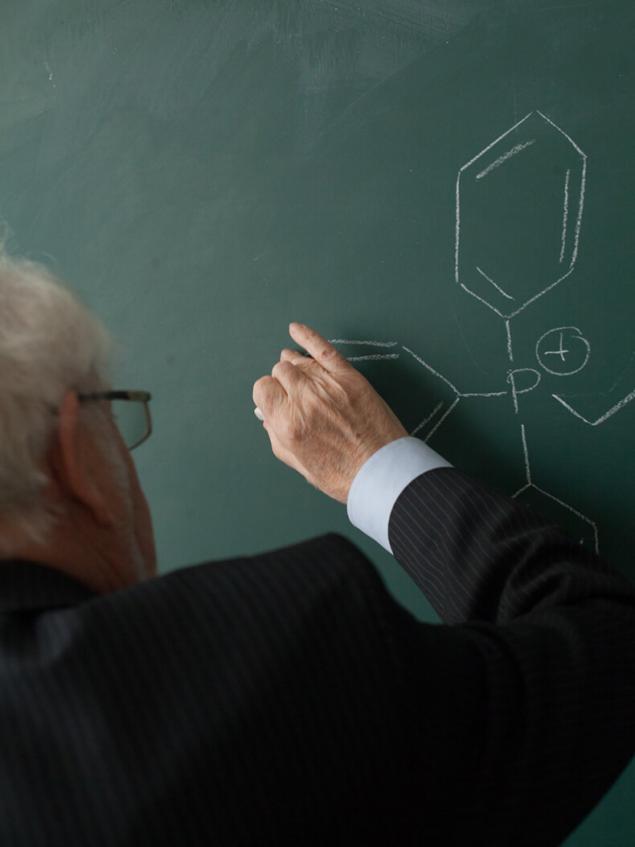
On the psyche of centenarians and immortality
- It all sounds fantastic. But what to do with the psyche – after all, our clock will continue to start the countdown?
- Yes, they will work, but their “Grow Old” signal won’t work. That is, they order the cell to age, it is ready, and the “Samurai sword”, poisonous forms of oxygen, is not. I am absolutely convinced that we die not because the body has worn out, but because there is an order to die, this process starts and slowly increases with age.
But not all animals do. For example, albatrosses die in one day. They live healthy 60 years and with age fly further, their wings become more powerful, that is, no aging occurs at all. And then at some point they suddenly die.
- Do you believe in psychosomatics, in the fact that all our diseases are from the head, and, roughly speaking, a person wants to die and therefore dies?
- Yes, there is such a relationship. Nobel laureates live an average of 15 years longer than other people. And conductors live ten years longer than the orchestrators they control, and they have their own psychology. Why do harpists live longer than pianists?
- That is, you do not exclude that, despite taking your drug, at some stage, a malfunction may occur and the body will still tend to death?
- This is the main danger: nature has come up with several paths to death, and we study only one. But even if we can solve one problem, it's still likely to lead to longer healthy lives.
- Are you not afraid to interfere in nature, perhaps even in the divine nature of man?
- I'm an agnostic and I don't know if there's a god. The problem seems unknowable.
- Have you encountered something in the human body that cannot be explained by science?
- With things like a black hole, when the speed of light is no longer the maximum speed of travel, I have not encountered in man. There are no black holes in the human body.
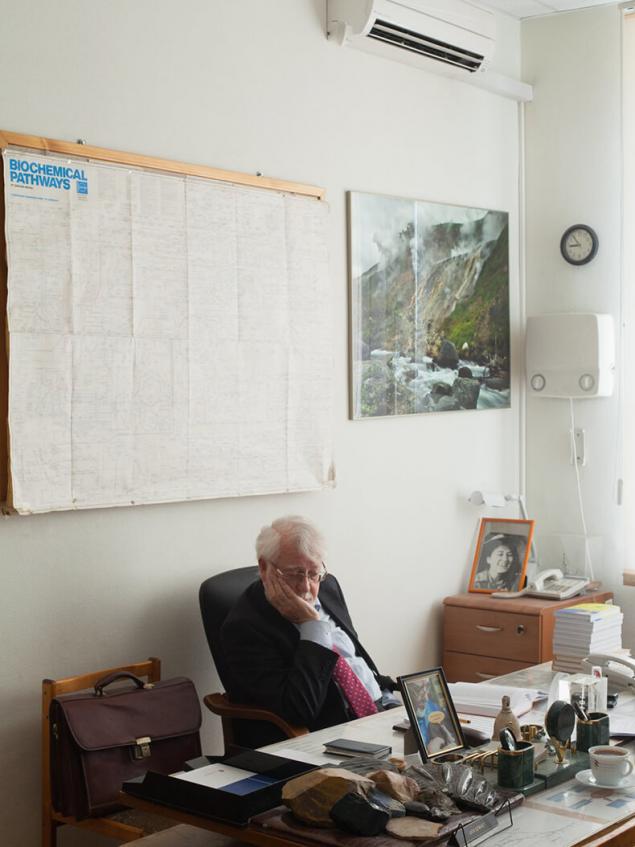
- Then is immortality possible?
- I don't know, that's a question I can't answer. Immortality will be when a person can be restored after a concrete slab falls on him. This method was invented by nature. When a jellyfish becomes ill, it acts on the principle of "Mama, give birth to me back": each of its cells turns into a larval cell, the jellyfish gathers into a lump of single cells - a polyp - and waits for conditions to improve. She does not try to adapt to these unfavorable conditions, but goes back in her individual development. But man is not a jellyfish. published
Also read: Stephen Hawking: As long as there is life, there is hope.
Mikhail Labkovsky: Worrying about something insignificant means being neurotic.
P.S. And remember, just changing our consumption – together we change the world!
Source: www.the-village.ru/village/people/city-news/234113-old_age
Its author, Academician of the Russian Academy of Sciences, Director of the Research Institute of FHB named after A. N. Belozersky Moscow State University, Dean of the Faculty of Bioengineering and Bioinformatics of Moscow State University Vladimir Skulachev told The Village whether scientists have learned to prolong life and how science will help to avoid humiliating old age.

Long Life and the Elixir of Youth
- Is it true that using your SkQ1 ions can slow aging?
- If all goes well, then to some extent yes. We act on a stimulant of aging - poisonous forms of oxygen. They are formed in the mitochondria, and their level increases with age. And our ions, such as the mitochondrial antioxidant SkQ1, neutralize toxic oxygen species.
- How did you come to the conclusion that mitochondria should be affected and that the aging process is tied to them?
- This was not invented by us, but by the American scientist Denham Harman - he put forward a theory back in the 70s that aging occurs due to poisoning of the body by its own toxic forms of oxygen, which are formed in the mitochondria. Mitochondria serve as a kind of thermal powerhouse of the cell. As they age, they produce more and more toxic oxygen species, which I call the samurai sword of the cell. It must be knocked out of the “hands” of the cell that intends to kill itself, and thereby accelerate the aging of the body. We believe that aging is a disease that can be treated with conventional medications.
- And can this be done with your connection? How does it affect cells?
- This is a synthetic compound called SkQ1, which is not found in nature. It consists of two parts: the so-called Skulachev ion, or SkQ+, and the powerful plant antioxidant plastoquinone (Q), connected by a chain of carbon atoms. The compound is positively charged and penetrates the mitochondria because it is the only compartment in the cell whose inner space is negatively charged. So simple physics works here. And then this substance neutralizes toxic forms of oxygen.
- Is there any evidence that this really works?
- We have tested on different mammals, fungi, plants and invertebrates. Almost everywhere there was a significant increase in life expectancy with very small amounts of SkQ1.
- How important is it?
- Different creatures have different things. In mice, for example, the record increase in life expectancy after the drug is twice. About the same - in crustaceans, and in fruit flies - less, we are talking about 15%. As for mice, the first experiments we asked to put the President of the Russian Society of Gerontologists Vladimir Anisimov at the Institute of Oncology in St. Petersburg.
There was never money, and there was not enough money to maintain the vivarium, so the mice contracted various infections and did not live long. Those animals that received our substance survived, despite the fact that the vivarium was dirty, it produced infections from which mice would die earlier. In addition, these mice remained childbearing activity until death. They looked different on the outside.
If you take two mice of the same litter and the same age, the one that took SkQ1 looks really young: it has smooth hair, no slouching, a lush mustache. The second, on the contrary, has all the signs of old age: hump, inactivity, bald spots on the coat, no mustache.
- What did these mice eventually die of?
- Breast cancer. These experiments were put on females of the line of mice that are prone to this disease. In addition, it is a cancer that is resistant to our drug.

- Are there any cancers that SkQ1 can affect?
- Yeah, but for now, it's just mice. Human studies began six months ago, and we are now testing the safety of the drug. In total, there will be three stages: there is still a test for effectiveness on a small number of people in a short time and a long test on a large contingent. The trials are being conducted in parallel in the United States and Russia, at the First Gradskaya Hospital, and they will last about another two years.
- And what happens after that? Will the drug go on sale?
- Yes, it will be an elixir...
- Elixir of youth?
- That's right. But there is a big problem: doctors believe that old age is not cured, therefore, there can be no cure for old age. Therefore, the Ministry of Health is unlikely to approve the release of the “elixir of youth”. Most likely, it will be a drug for senile diseases and we will not advertise it as an anti-aging medicine at all.
The fact is that this area is very compromised, there are so many charlatans in it who are just trying to get money from gullible people. Among geriatricians (specialists in the treatment of elderly patients). There is even a saying: “Thousands of people were engaged in immortality, but they all died.”
Genghis Khan spent a lot of money to find sages who would prolong his life, and he died. Stalin was fond of the work of the gerontologist Alexander Bogomolets, but when he died in 1946 at the age of 65, the leader banged his fist on the table and exclaimed: “Dude, son of a bitch!”
I am absolutely convinced that we die not because the body has worn out, but because there is an order to die, and this process starts and proceeds slowly.
- Do you have any doubts about what you are doing?
- The goal is so sacred that if there is any chance of breaking through here, we should use it. After all, the horror lies not even in the very fact of death, but in the fact that a person dies humiliatingly: yesterday he was a ruler, but today he cannot bring a spoon to his mouth.
- So if things work out, people won't just live longer, they'll stop getting sick?
- Yes, we have already found that mice receiving SkQ1 have less memory loss and a reduced risk of cardiovascular disease. The most important thing is that people will live better, will be able to work longer, and this is beneficial to the authorities, because now the elderly are a huge burden for the state.
- Will you need to take elixir constantly? When to start, in old age or earlier?
- It will need to be taken continuously, but when to start is a good question. We tested on fruit flies and found that if you give them our substance only during the first week of life (and they live two months), then life expectancy increases. And if you start treatment in a month, then weekly therapy is not enough and you have to treat flies with the constant addition of SkQ1 to their food. It's not a fact that humans will react the same way a fly does, so we've now turned our attention to human clinical trials.
- Is it possible to say that this connection is completely safe?
- Ideally, it should be two years after the start of human trials, but I have been taking SkQ1 for four years - I'm an inventor, I can - and there are no side effects. I can honestly say that working capacity increases, there is more energy. The rest is hard to say considering I am 81.

- How affordable will this drug be? Is it not possible that only the rich can prolong their lives, and the poor will die?
- Elixir will be available. I cannot say how much it will cost, because we are not businessmen, we do not sell it ourselves, but conclude agreements with companies that cooperate with pharmacies. But SkQ1 itself is inexpensive and requires very little.
The first drug based on these ions that we released is eye drops. They are already in pharmacies and are recommended for patients with dry eye syndrome and cataracts. Drops, like SkQ1, affect mitochondria, and I used them to get rid of cataracts.
We developed a similar drug for animals and calculated that to provide medicine to all pets in Russia suffering from senile vision defects, it takes only four grams of our substance per year. Investors were very upset at the time. They thought we were going to build a whole plant, start production, and we still only have one small room to synthesize our substance. It acts in extremely low concentrations, precisely because it accumulates only in the mitochondria.
- So the medicine will be for everyone, regardless of social status?
- My dream is to add it to salt, just like iodine. Previously, all jokes were not about the Chukchi, but about the Swiss, because they had a high percentage of people suffering from cretinism. This is a medical concept, the consequences of a thyroid problem due to a lack of iodine. The situation changed when they began to add a little iodine to the salt. In the same way, I suggest putting our ions in salt to extend people's lives.
- This is a great humanitarian mission. Do you think government and investors will support you? Why hasn't the government seized on your designs yet?
- Because we're cunning and we don't want to be shouted about until we've done it. But at the same time, investors aroused interest in our drug. Until 2008, Oleg Deripaska gave us money, only thanks to this we were able to buy equipment and start research. I was also able to bring in scientists who had gone abroad in the past — we provided them with housing, rented them apartments.
In the best years in our research Institute Mitoengineering MSU worked up to three hundred people, and now there are about a hundred: times are difficult, business is bad. Since 2009, we have been helped by Rusnano and one private investor – a programmer, a graduate of Moscow State University. But from January 1, 2017, the investment ends, and we will have to live on the profit that we receive from the sale of eye drops and another cosmetic product, Mitovitan.
- Can you tell us more about this cosmetic?
- This serum, which prevents skin aging, is also effective in various inflammations, and even those that are not treated in other ways. We are currently conducting tests in Moscow.

On the psyche of centenarians and immortality
- It all sounds fantastic. But what to do with the psyche – after all, our clock will continue to start the countdown?
- Yes, they will work, but their “Grow Old” signal won’t work. That is, they order the cell to age, it is ready, and the “Samurai sword”, poisonous forms of oxygen, is not. I am absolutely convinced that we die not because the body has worn out, but because there is an order to die, this process starts and slowly increases with age.
But not all animals do. For example, albatrosses die in one day. They live healthy 60 years and with age fly further, their wings become more powerful, that is, no aging occurs at all. And then at some point they suddenly die.
- Do you believe in psychosomatics, in the fact that all our diseases are from the head, and, roughly speaking, a person wants to die and therefore dies?
- Yes, there is such a relationship. Nobel laureates live an average of 15 years longer than other people. And conductors live ten years longer than the orchestrators they control, and they have their own psychology. Why do harpists live longer than pianists?
- That is, you do not exclude that, despite taking your drug, at some stage, a malfunction may occur and the body will still tend to death?
- This is the main danger: nature has come up with several paths to death, and we study only one. But even if we can solve one problem, it's still likely to lead to longer healthy lives.
- Are you not afraid to interfere in nature, perhaps even in the divine nature of man?
- I'm an agnostic and I don't know if there's a god. The problem seems unknowable.
- Have you encountered something in the human body that cannot be explained by science?
- With things like a black hole, when the speed of light is no longer the maximum speed of travel, I have not encountered in man. There are no black holes in the human body.

- Then is immortality possible?
- I don't know, that's a question I can't answer. Immortality will be when a person can be restored after a concrete slab falls on him. This method was invented by nature. When a jellyfish becomes ill, it acts on the principle of "Mama, give birth to me back": each of its cells turns into a larval cell, the jellyfish gathers into a lump of single cells - a polyp - and waits for conditions to improve. She does not try to adapt to these unfavorable conditions, but goes back in her individual development. But man is not a jellyfish. published
Also read: Stephen Hawking: As long as there is life, there is hope.
Mikhail Labkovsky: Worrying about something insignificant means being neurotic.
P.S. And remember, just changing our consumption – together we change the world!
Source: www.the-village.ru/village/people/city-news/234113-old_age
Amazing soup, beets with ginger and orange
Safety in social networking: don't keep the keys under the Mat





